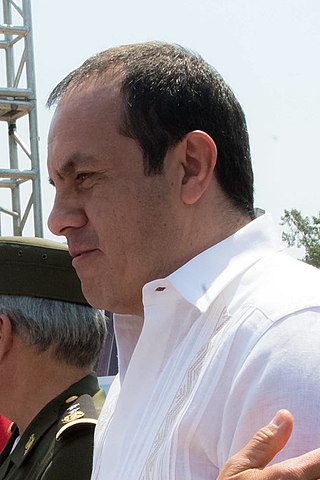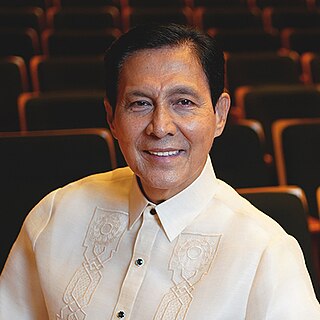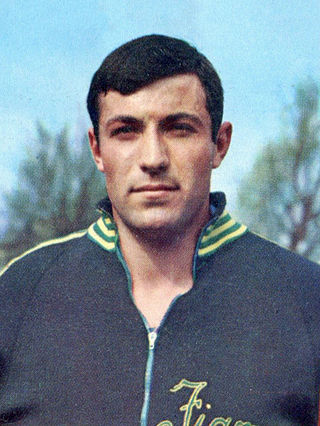Related Research Articles

René François Ghislain Magritte was a Belgian surrealist artist known for his depictions of familiar objects in unfamiliar, unexpected contexts, which often provoked questions about the nature and boundaries of reality and representation. His imagery has influenced pop art, minimalist art, and conceptual art.
Vincenzo Silvano Casulli, usually known as Silvano Casulli was an Italian amateur astronomer and a discoverer of minor planets at his Vallemare di Borbona Observatory in Lazio.

Cuauhtémoc Blanco Bravo is a Mexican politician and former professional footballer serving as a member of the Chamber of Deputies. He also served as the Governor of Morelos from 2018 to 2024 under the coalition Juntos Haremos Historia, and as the municipal president of Cuernavaca, Morelos. As a footballer, Blanco was known for his attacking ability and played most of his career as a deep-lying forward and his last years as an attacking midfielder. Blanco is considered to be one of the greatest Mexican footballers of all time.

Silvano Piovanelli was an Italian cardinal of the Catholic Church. He served as Archbishop of Florence from 1983 to 2001, and was elevated to the cardinalate in 1985.

Silvano Arieti was a psychiatrist regarded as one of the world's foremost authorities on schizophrenia. He received his M.D. from the University of Pisa and left Italy soon after, due to the increasingly antisemitic racial policies of Benito Mussolini.

Silvano d'Orba is a comune (municipality) in the Province of Alessandria in the Italian region Piedmont, located about 90 kilometres (56 mi) southeast of Turin and about 25 kilometres (16 mi) south of Alessandria. As of 31 December 2004, it had a population of 1,856 and an area of 12.1 square kilometres (4.7 sq mi).

Silvano Pietra is a comune (municipality) in the Province of Pavia in the Italian region Lombardy, located about 50 km southwest of Milan and about 25 km southwest of Pavia. As of 31 December 2004, it had a population of 723 and an area of 13.8 km2.

Griselda Blanco Restrepo was a Colombian drug lord who was prominent in the cocaine-based drug trade and underworld of Miami, during the 1970s through the early 2000s, and who has also been claimed by some to have been part of the Medellín Cartel. She was shot dead in Medellín on September 3, 2012 at the age of 69.

Silvano Aureoles Conejo is a Mexican politician affiliated with the Party of the Democratic Revolution (PRD) and former governor of Michoacán.

Zihuatanejo de Azueta is a municipality in the Mexican state of Guerrero. It includes the major resort communities of Zihuatanejo and Ixtapa in addition to numerous other towns. In 2010 it had a population of 118,211 inhabitants. It has an area of 1468 km². Its municipal seat is the city of Zihuatanejo. Its municipal president for the 2005-08 period was Silvano Blanco Deaquino.
Judi Silvano is a jazz singer and composer.
The Switzerland men's national pitch and putt team represents Switzerland in the pitch and putt international competitions. It is managed by the Schweizerischen Pitch and Putt Verband-Swiss Pitch and Putt Association (SPPA). Since 2016 Swiss Pitch and Putt Federation (SPPF)

Tirso Silvano Cruz III is a Filipino actor, comedian, and singer. He was the Chairperson of the Film Development Council of the Philippines after one year and seven months for personal reasons. Regarded as a "matinee idol", Cruz is a FAMAS Award and Gawad Urian Award recipient.

Benjamin Joseph Levin, known professionally as Benny Blanco, is an American record producer, songwriter, record executive and author. He is the recipient of the 2013 Hal David Starlight Award from the Songwriters Hall of Fame. He has also won five BMI Songwriter of the Year Awards, won the 2017 iHeartRadio Producer of the Year Award, and received 11 Grammy Award nominations.

Silvano Simeon was an Italian discus thrower. He competed at the 1972 and 1976 Olympics and finished in 10th and 19th place, respectively.

Silvano Chesani is an Italian high jumper.

Silvano Meconi was an Italian shot putter who won two medals at the Mediterranean Games.
The Basketball Bundesliga 2013–14 was the 48th season of the Basketball Bundesliga. The regular season started on 3 October 2013 and ended on 1 May 2014. Bayern Munich won its third German title, by beating Alba Berlin 3–1 in the Finals. Bayern player Malcolm Delaney was named both MVP and Finals MVP of the season.
Da Silvano was an Italian restaurant in the West Village neighborhood of Manhattan in New York City, known for its celebrity clientele and gregarious owner Silvano Marchetto (1946-2024). The eatery opened in 1975 and shut its doors in December 2016 some 41 odd years later. Jack Nicholson and Leo Castelli ate there once.

Silvano Poropat is a Croatian professional basketball coach. Poropat started his coaching career in 2000, and since then he has coached in Germany, Latvia and the Netherlands.
References
- ↑ "Perfil: Dip. Silvano Blanco Deaquino, LXII Legislatura". Sistema de Información Legislativa (SIL). SEGOB . Retrieved 8 August 2024.